- Home
- Fergus Hume
The Opal Serpent Page 14
The Opal Serpent Read online
Page 14
CHAPTER XIV
MR. HAY'S LITTLE DINNER
The detective was as good as his word. In a few days Paul was introducedto the editor of a weekly publication and obtained a commission for astory to be written in collaboration with Mr. Hurd. It seemed that theeditor was an old acquaintance of Hurd's and had been extricated by himfrom some trouble connected with cards. The editor, to show hisgratitude, and because that Hurd's experiences, thrown into the form ofa story, could not fail to interest the public, was only too willing tomake a liberal arrangement. Also Paul was permanently engaged to supplyshort stories, to read those that were submitted to the editor, and, infact, he permanently became that gentleman's right hand. He was a kind,beery Bohemian of an editor, Scott by name, and took quite a fancy toPaul.
"I'll give you three pounds a week," said Scott, beaming through hislarge spectacles and raking his long gray beard with tobacco-stainedfingers, "you can live on that, and to earn it you can give me youropinion on the stories. Then between whiles you can talk to Hurd andwrite this yarn which I am sure will be interesting. Hurd has had somequeer experiences."
This was quite true. Hurd had ventured on strange waters, but thestrangest he ever sailed on were those connected with the Gwynne Streetcase. These latter experiences he did not tell to Scott, who wasincapable of holding his tongue, and secrecy, as the detective impressedon Paul, was absolutely necessary to the conduct of the case. "If wekeep matters quiet," argued Hurd, "and let those concerned in the matterfancy the case has been dropped, we'll be able to throw them off theirguard, and then they may betray themselves."
"I wish you would say if you think there is one person or two," saidPaul, irritably, for his nerves were wearing thin under the strain. "Youfirst talk of the assassin and then of the assassins."
"Well," drawled Hurd, smiling, "I'm in the dark, you see, and being onlya flesh and blood human being, instead of a creation of one of youauthors, I can only grope in the dark and look in every direction forthe light. One person, two persons, three, even four may be engaged inthis affair for all I know. Don't you be in a hurry, Mr. Beecot. Ibelieve in that foreign chap's saying, 'Without haste without rest.'"
"Goethe said that."
"Then Goethe is a sensible man, and must have read his Bible. 'Make nohaste in time of trouble,' says the Scriptures."
"Very good," assented Beecot; "take your own time."
"I intend to," said Hurd, coolly. "Bless you, slow and sure is my motto.There's no hurry. You are fixed up with enough to live on, and aprospect of making more. Your young lady is happy enough with thatgrenadier of a woman in spite of the humbleness of the home. Mrs. Krilland her daughter are enjoying the five thousand a year, and Mr. GrexonHay is fleecing that young ass, Lord George Sandal, as easily aspossible. I stand by and watch everything. When the time comes I'llpounce down on--"
"Ah," said Paul, "that's the question. On whom?"
"On one or two or a baker's dozen," rejoined Hurd, calmly. "My chickensain't hatched yet, so I don't count 'em. By the way, is your oldschool-fellow as friendly as ever?"
"Yes. Why, I can't understand; as he certainly will make no money out ofme. He's giving a small dinner to-morrow night at his rooms and hasasked me."
"You go," said the detective, emphatically; "and don't let on you haveanything to do with me."
"See here, Hurd, I won't play the spy, if you mean that."
"I don't mean anything of the sort," replied Hurd, earnestly, "but ifyou do chance to meet Mrs. Krill at this dinner, and if she does chanceto drop a few words about her past, you might let me know."
"Oh, I don't mind doing that," said Beecot, with relief. "I am asanxious to find out the truth about this murder as you are, if not moreso. The truth, I take it, is to be found in Krill's past, before he tookthe name of Norman. Mrs. Krill will know of that past, and I'll try andlearn all I can from her. But Hay has nothing to do with the crime, andI won't spy on him."
"Very good. Do what you like. But as to Hay, having nothing to do withthe matter, I still think Hay stole that opal brooch from you when youwere knocked down."
"In that case Hay must know who killed Norman," cried Paul, excited.
"He just does," rejoined Hurd, calmly; "and now you can understandanother reason why I take such an interest in that gentleman."
"But you can't be certain?"
"Quite so. I am in the dark, as I said before. But Hay is a dangerousman and would do anything to rake in the dollars. He has something to dowith the disappearance of that brooch I am sure, and if so, he knowsmore than he says. Besides"--here Hurd hesitated--"No! I'll tell youthat later."
"Tell me what?"
"Something about Hay that will astonish you and make you think he hassomething to do with the crime. Meanwhile, learn all you can from Mrs.Krill."
"If I meet her," said Paul, with a shrug.
Undoubtedly Hurd knew more than he was prepared to admit, and not evento Paul, staunch as he knew him to be, would he speak confidentially.When the time came the detective would speak out. At present he held histongue and moved in clouds like a Homeric deity. But his eyes were onall those connected with the late Aaron Norman, indirectly or directly,although each and every one of them were unaware of the scrutiny.
Paul had no scruples in learning all he could from Mrs. Krill. He didnot think that she had killed her husband, and probably might beignorant of the person or persons who had slain the poor wretch in socruel a manner. But the motive of the crime was to be found in Norman'spast, and Mrs. Krill knew all about this. Therefore, Paul was verypleased when he found that Mrs. Krill and her daughter were the guestsat the little dinner.
Hay's rooms were large and luxuriously furnished. In effect, he occupieda small flat in the house of an ex-butler, and had furnished the placehimself in a Sybarite fashion. The ex-butler and his wife and servantslooked after Hay, and in addition, that languid gentleman possessed aslim valet, with a sly face, who looked as though he knew more than wasgood for him. Indeed, the whole atmosphere of the rooms was shady andfast, and Paul, simple young fellow as he was, felt the bad influencethe moment he stepped into the tiny drawing-room.
This was furnished daintily and with great taste in color andfurnishing. It was more like a woman's room, and Mr. Hay had spared nocost in making it pleasing to the eye and comfortable to the body. Theprevailing tone was pale yellow, and the electric light suffused itselfthrough lemon-shaded globes. The Louis Quinze furniture was upholsteredin primrose, and there were many Persian praying mats and Easterndraperies about the place. Water-color pictures decked the walls, andnumerous mirrors reflected the dainty, pretty apartment. A brisk firewas burning, although the evening was not cold, and everything lookeddelightfully pleasant. Paul could not help contrasting all this luxuryand taste with his bare garret. But with Sylvia's love to warm hisheart, he would not have changed places with Grexon Hay for all hissplendor.
Two ladies were seated by the fire. Mrs. Krill in black, majestic andcalm as usual. She wore diamonds on her breast and jewelled stars in hergray hair. Although not young, she was a wonderfully well-preservedwoman, and her arms and neck were white, gleaming and beautifullyshaped. From the top of her head to the sole of her rather large butwell-shod foot, she was dressed to perfection, and waved a languid fanas she welcomed Paul, who was presented to her by the host. "I am gladto see you, Mr. Beecot," she said in her deep voice; "we had rather anunhappy interview when last we met. How is Miss Norman?"
"She is quite well," replied Paul, in as cordial a tone as he couldcommand. For the sake of learning what he could, he wished to beamiable, but it was difficult when he reflected that this large, suave,smiling woman had robbed Sylvia of a fortune and had spoken of her in acontemptuous way. But Beecot, swallowing down his pride, held his littlecandle to the devil without revealing his repugnance too openly. Andapparently Mrs. Krill believed that his composure was genuine enough,for she was quite at her ease in his presence.
The daughter was dressed like the mother, save that sh
e wore pearls inplace of diamonds. She talked but little, as usual, and sat smiling, theyoung image of the older woman. Hay also introduced Paul to a handsomeyoung fellow of twenty-one with rather a feeble face. This was LordGeorge Sandal, the pigeon Hay was plucking, and although he had charmingmanners and an assumption of worldly wisdom, he was evidently one ofthose who had come into the world saddled and bridled for other folk'sriding.
A third lady was also present, who called herself Aurora Qian, and Hayinformed his friend in a whisper that she was an actress. Paul thenremembered that he had seen her name in the papers as famous in lightcomedy. She was pretty and kittenish, with fluffy hair and an eternalsmile. It was impossible to imagine a greater contrast to the massivefirmness of Mrs. Krill than the lively, girlish demeanor of the littlewoman, yet Paul had an instinct that Miss Qian, in spite of herprofession and odd name and childish giggle, was a more shrewd personthan she looked. Everyone was bright and merry and chatty: all save MaudKrill who smiled and fanned herself in a statuesque way. Hay paid hergreat attention, and Paul knew very well that he intended to marry thesilent woman for her money. It would be hardly earned he thought, withsuch a firm-looking mother-in-law as Mrs. Krill would certainly prove tobe.
The dinner was delightful, well cooked, daintily served, and leisurelyeaten. A red-shaded lamp threw a rosy light on the white cloth, theglittering crystal and bright silver. The number of diners was less thanthe Muses, and more than the Graces, and everyone laid himself orherself out to make things bright. And again Maud Krill may bementioned as an exception. She ate well and held her tongue, merelysmiling heavily when addressed. Paul, glancing at her serene face acrossthe rosy-hued table, wondered if she really was as calm as she looked,and if she really lacked the brain power her mother seemed to possess.
"I am glad to see you here, Beecot," said Hay, smiling.
"I am very glad to be here," said Paul, adapting himself tocircumstances, "especially in such pleasant company."
"You don't go out much," said Lord George.
"No, I am a poor author who has yet to win his spurs."
"I thought of being an author myself," said the young man, "but it wassuch a fag to think about things."
"You want your material supplied to you perhaps," put in Mrs. Krill in acalm, contemptuous way.
"Oh, no! If I wrote stories like the author johnnies I'd rake up myfamily history. There's lots of fun there."
"Your family mightn't like it," giggled Miss Qian. "I know lots ofthings about my own people which would read delightfully if Mr. Beecotset them down, but then--" she shrugged her dainty shoulders, "oh, dearme, what a row there would be!"
"I suppose there is a skeleton in every cupboard," said Hay, suavely,and quite ignoring the shady tenant in his own.
"There's a whole dozen cupboards with skeletons to match in my family,"said the young lord. "Why, I had an aunt, Lady Rachel Sandal, who wasmurdered over twenty years ago. Now," he said, looking triumphantlyround the table, "which of you can say there's a murder in yourfamily--eh, ladies and gentlemen?"
Paul glanced sideways at Mrs. Krill, wondering what she would say, andwondering also how it was that Lord George did not know she was thewidow of the murdered Lemuel Krill, whose name had been so widelyadvertised. But Hay spoke before anyone could make a remark. "What anunpleasant subject," he said, with a pretended shudder, "let us talk ofless melodramatic things."
"Oh, why," said Mrs. Krill, using her fan. "I rather like to hear aboutmurders."
Lord George looked oddly at her, and seemed about to speak. Paul thoughtfor the moment that he did know about the Gwynne Street crime andintended to remark thereon. But if so his good taste told him that hewould be ill-advised to speak and he turned to ask for another glass ofwine. Miss Aurora Qian looked in her pretty shrewd way from one to theother. "I just love the Newgate Calendar," she said, clasping her hands."There's lovely plots for dramas to be found there. Don't you think so,Mr. Beecot?"
"I don't read that sort of literature, Miss Qian."
"Ah, then you don't know what people are capable of in the way ofcruelty, Mr. Beecot."
"I don't want to know," retorted Paul, finding the subject distastefuland wondering why the actress pressed it, as she undoubtedly did. "Iprefer to write stories to elevate the mind."
Miss Qian made a grimace and shot a meaning look at him. "It doesn'tpay," she said, tittering, "and money is what we all want."
"I fear I don't care for money overmuch."
"No," said Mrs. Krill to him in an undertone, "I know that from the wayyou spoke in Mr. Pash's office."
"I was standing up for the rights of another."
"You will be rewarded," she replied meaningly, but what she did meanPaul could not understand.
The rest of the dinner passed off well enough, as the subject waschanged. Lord George began to talk of racing, and Hay responded. Mrs.Krill alone seemed shocked. "I don't believe in gambling," she saidicily.
"I hope you are not very down on it," said Hay. "Lord George and Ipropose to play bridge with you ladies in the next room."
"Maud can play and Miss Qian," said the widow. "I'll talk to Mr. Beecot,unless he prefers the fascination of the green cloth."
"I would rather talk to you," replied Paul, bowing.
Mrs. Krill nodded, and then went out of the room with the youngerladies. The three gentlemen filled their glasses with port, and Haypassed round a box of cigars. Soon they were smoking and chatting, in amost amicable fashion. Lord George talked a great deal about racing andcards, and his bad luck with both. Hay said very little and every nowand then cast a glance at Paul, to see how he was taking theconversation. At length, when Sandal became a trifle vehement on thesubject of his losses, Hay abruptly changed the subject, by refillinghis glass and those of his companions. "I want you to drink to thehealth of my future bride," he said.
"What," cried Paul, staring, "Miss Krill?"
"The same," responded Hay, coldly. "You see I have taken your advice andintend to settle. Pash presented me to the ladies when next they came tohis office, and since then I have been almost constantly with them. MissKrill's affections were disengaged, and she, therefore, with hermother's consent, became my promised wife."
"I wish you joy," said Lord George, draining his glass and fillinganother, "and, by Jove! for your sake, I hope she's got money."
"Oh, yes, she's well off," said Hay, calmly, "and you, Paul?"
"I congratulate you, of course," stammered Beecot, dazed; "but it's sosudden. You haven't known her above a month."
"Five weeks or so," said Hay, smiling, and sinking his voice lower, headded, "I can't afford to let grass grow under my feet. This young asshere might snap her up, and Mrs. Krill would only be too glad to securea title for Maud."
"I say," said Lord George suddenly, and waking from a brown study, "whois Mrs. Krill? I've heard the name."
"It's not an uncommon name," said Hay, untruthfully and quickly. "She isa rich widow who has lately come to London."
"Where did she come from?"
"I can't tell you that. From the wilds of Yorkshire I believe. You hadbetter ask her."
"Oh, by Jove, no, I wouldn't be so rude. But I seem to know the name."Paul privately thought that if he read the papers, he ought certainly toknow the name, and he was on the point of making, perhaps an injudiciousremark, but Hay pointedly looked at him in such a meaning way, that heheld his tongue. More, when they left their wine for the society of theladies, Hay squeezed his friend's arm in the passage.
"Don't mention the death," he said, using a politer word by preference."Sandal doesn't connect Mrs. Krill with the dead man. She wants to livethe matter down."
"In that case she ought to leave London for a time."
"She intends to. When I make Maud my wife, we will travel with hermother for a year or two, until the scandal of the murder blows over.Luckily the name of Lemuel Krill was not mentioned often in the papers,and Sandal hasn't seen a hand-bill that I know of. I suppose you agreewith me that
silence is judicious?"
"Yes," assented Paul, "I think it is."
"And you congratulate me on my approaching marriage?"
"Certainly. Now, perhaps, you will live like Falstaff when he was made aknight."
Hay did not understand the allusion and looked puzzled. However, he hadno time to say more, as they entered the drawing-room. Almost as soon asthey did, Mrs. Krill summoned Paul to her side.
"And now," she said, "let us talk of Miss Norman."

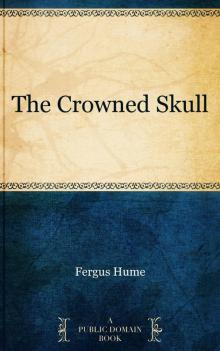 The Crowned Skull
The Crowned Skull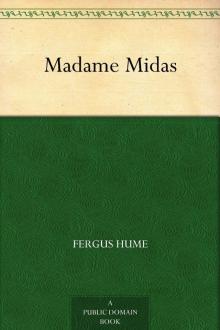 Madame Midas
Madame Midas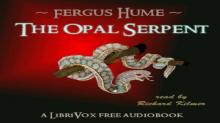 The Opal Serpent
The Opal Serpent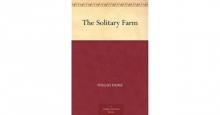 The Solitary Farm
The Solitary Farm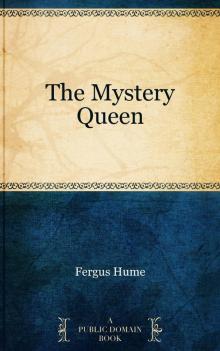 The Mystery Queen
The Mystery Queen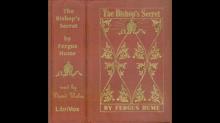 The Bishop's Secret
The Bishop's Secret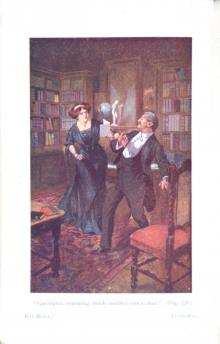 Red Money
Red Money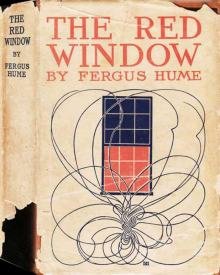 The Red Window
The Red Window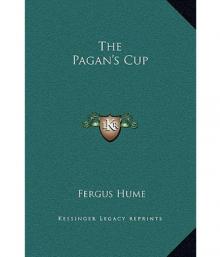 The Pagan's Cup
The Pagan's Cup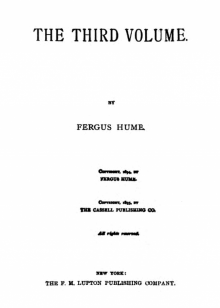 The Third Volume
The Third Volume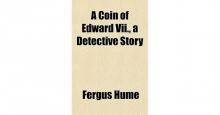 A Coin of Edward VII: A Detective Story
A Coin of Edward VII: A Detective Story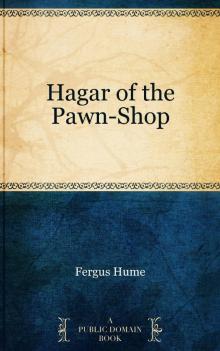 Hagar of the Pawn-Shop
Hagar of the Pawn-Shop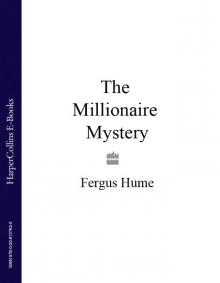 The Millionaire Mystery
The Millionaire Mystery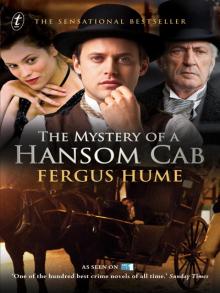 The Mystery of a Hansom Cab
The Mystery of a Hansom Cab